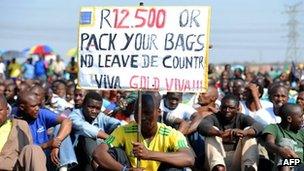South Africa vows clampdown on Marikana mine unrest
- Published

The Marikana miners have been striking for five weeks, demanding better pay
South Africa's government has announced a raft of measures to clamp down on continuing unrest in the mining sector.
It warned it would crack down "very swiftly" on anyone involved in an illegal gathering or carrying weapons.
However, Justice Minister Jeff Radebe said that this did not amount to a state of emergency.
The move came as striking workers at the Marikana platinum mine rejected a pay offer from the management and some unions threatened a general strike.
Despite the government warning, unrest continued in the Rustenburg area. Leading platinum producer Aquarius closed a mine after protesters gathered outside, while Xstrata shut a nearby chrome plant.
The mining unrest has been marked by violent clashes, including the shooting dead of 34 striking miners by police at Marikana in August.
It has since spread to other gold and platinum mines in South Africa - a major exporter of precious minerals.
Finance Minister Pravin Gordhan warned on Friday that the continuing unrest could hurt economic growth, jobs and investor confidence in Africa's biggest economy.
'Insult'
The latest measures were announced following a meeting of ministers representing the security cluster in President Jacob Zuma's cabinet.
Mr Radebe warned that anyone taking part in illegal protests would be "dealt with very swiftly, without any further delay".
"Our government will not tolerate these acts any further," the minister said.
Police Minister Nathi Mthethwa stressed that the government had "an obligation to ensure that people... are safe in South Africa".
The strike has seen hundreds of protesting workers brandishing sticks and machetes march from mine to mine around Marikana and other areas, threatening anyone reporting for work.
The BBC's Pumza Fihlani in Johannesburg says the government's move could heighten tension in Marikana, where miners feel that the authorities have neglected their pleas and turned a blind eye to their living and working conditions.
Arresting thousands of armed protesters is a near impossible task, our correspondent says, as this could escalate into further violent clashes.
Charging protesters and processing them through the courts could prove to be a logistical nightmare for the authorities, as was the case when 270 miners were charged for murder and subsequently released in recent weeks, she says.
Earlier on Friday, the Marikana miners gathered on a hill near the mine rejected the pay offer by Lonmin, one of the world's biggest platinum producers.
The BBC's Nomsa Maseko says the strike, now in it's fifth week, is beginning to take a more militant tone
They said the proposal envisaged a pay rise of just under 1,000 rand a month - far lower than the 12,500 rand ($1,513; £935) they were demanding. Miners currently earn between 4,000 and 5,000 rand.
"What they [the workers] say is that their offer is an insult, what you put on the table is an insult," miners' representative Molisi Phele told AFP news agency.
"We are going back to tell them [Lonmin], the workers say: 'Thank you for giving us nothing,'" Mr Phele added.
Protest leaders have threatened a general strike if their demands are not met. They are supported by the militant Association of Mineworkers and Construction Union (Amcu).
The National Union of Mineworkers (NUM), which is allied to the ANC-led government, earlier told the BBC that it was concerned about the high level of violence and job losses in the mining sector.
In response to the threat of a general strike, the government placed its military on high alert - the first such move since democracy came to the country in 1994.
Earlier this week, Anglo American Platinum (Amplats) suspended work at its platinum mines in the region following unrest.
The strike began at the Marikana mine in August and 10 people, including two police officers, were killed as the dispute turned violent days before the police opened fire.
- Published13 September 2012
- Published12 September 2012
- Published8 September 2012
- Published24 August 2012
- Published23 August 2012